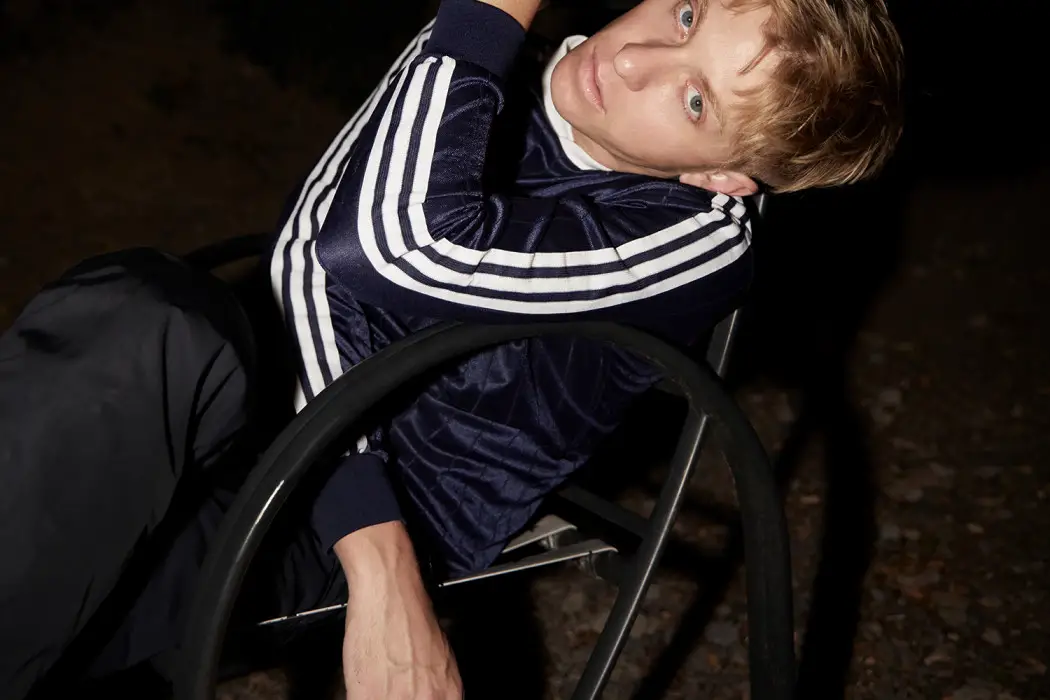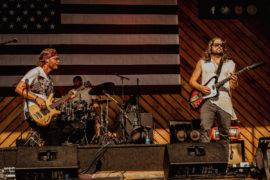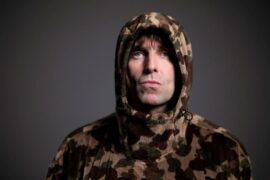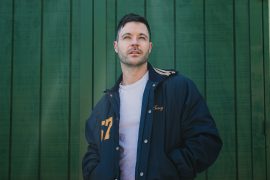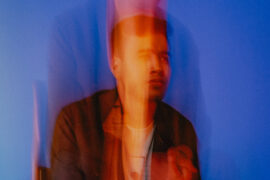A decade’s worth of records and a number of directional shifts along the way, The Drums find new solidarity on ‘Brutalism.’ Atwood Magazine spoke with Jonathon Pierce about his creation process, and if there were to be one main takeaway, it’s that “privacy is overrated.”
— —

Jonathon Pierce is the last originating member of The Drums, but that does not make the latest record Brutalism a solo effort by any means. In fact, Pierce calls it the first time he has really truly worked with others in constructing a record. What once was an artist protecting the delicacy of their unique sound, has become a sharing of ideas and passion. Released April 5th via ANTI- Records, Brutalism showcases Pierce in his rawest, most personal state yet. With an upcoming North American tour, Pierce spoke to Atwood Magazine about all that went into the album, the tour, and everything in between.
What followed was a conversation, not an interview. There was even a short discourse on how we occupy space in modern society. In a healthy and conducive manner, both of us shared brief thoughts and a couple of laughs. It shows the sort of important character that Pierce is. A separation from artist and human that made the rest of the time feel as if I was calling an old friend. What added even more to this though, was him asking if it was okay to “walk around Manhattan” during our time together. The distinct sounds of whistles and car horns rang throughout the background and we continued onward.
:: THE DRUMS ::
Atwood Magazine: You are bringing along with you both CHAI and Tanukichan as opening acts on your current tour. While both fit your vibe, was there a concerted effort in getting upcoming Asian acts, or was it simply happenstance?
Jonathon Pierce: A bit of both really. When I became essentially a solo act it left, a lot of space for me to write not just songs that are more a reflection of what I feel, with sounds that are a reflection upon what I want to make. It also made room and made space for me to sort of curate people that I want to surround me when I am on tour. It did not stop with my band; I have a lesbian playing bass with me. I have someone who is bi-sexual on the other guitar. I am gay! We got a straight guy on the drums. My front of house is a woman and half the crew is female. I feel there has been so much space occupied by straight guys in rock music and I thought it would be really nice to bring a more well-rounded show on tour. So, by having people from different ethnicities and different genders, I felt like it is just a more responsible and beautiful to present your work.
I could not be more excited! I do not want to categorize people, yet sometimes you have to be specific to make sure that you are being inclusive. That is kind of where we are at. I thought back on my time in The Drums before this tour, and really, I think I have only ever employed in my ten years, a few women here and there. Everyone else that surrounded me during that time was just straight men, and I see so much more in the world than that.
You mentioned becoming essentially a “solo act.” Would you consider Brutalism to be your first true solo record under The Drums?
Jonathon Pierce: Brutalism is actually the first record where I felt like I was truly collaborating. Even in a way that at times felt uncomfortable. The first couple EP’s that we released, our first album, all the way to Abysmal Thoughts. All of it was 95% me by myself, recording and producing in my room, and I would hand that over to whomever was mastering. It was a lot of work, but in the beginning stages of the band, I feel like it was important. We had a very specific direction we were going, and we sought after a delicate sound that I guess I was trying to protect. We shut out influences and turned down collaborations, just to be careful of preserving the sound. What I have realized though is that, that is great when you are finding who you are. 8 years down though, that strength starts to become a weakness. I started to get bored with doing it all by myself. Bored and overwhelmed. With this record, I wanted to do something fresh. Something new and rich in texture that I probably could not do by myself.
In life, once we embrace that scary idea or outside thought, it ends up becoming the greatest gift. In the case of Brutalism I brought in my band members to record with me and the songs on the album would not be what they are without them. I even brought in a sound engineer and we went up to northern California and re-recorded every sound off the demos. It heightened everything we were doing and made it something exceptional. It felt like an honor to be working with all these incredible people and something I am thankful I let myself do.
Not only is doing this kind of work on your own a lonely experience, it is also a very stressful one. After this, I cannot imagine ever going back to doing the records alone. The band will head from here in this direction.
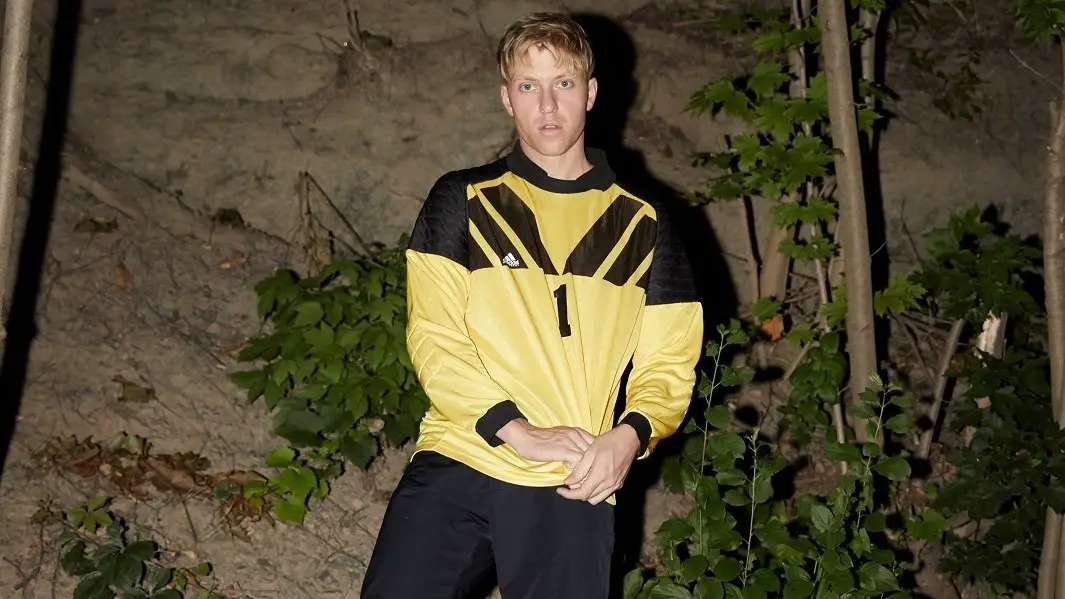
It is nice to hear you say that because up until this year I would have considered myself a “lone wolf” of sorts. Yet, through reaching out, I have found it tremendously helpful and a weight off my shoulders in my work and everything that I do.
Jonathon Pierce: Yeah and I think I find joy in that too. I have always been someone that has carried my emotions with me. I have dealt with depression my whole life and it is always easier to hide it away then to deal with it. Then, the longer you stew in it though, the bigger that weight gets and the harder it is to break out of it. What I have learned through talking to others and just taking time to listen to my heart is that by reaching out and letting people in. That is where I find peace. Reconnecting through sentiments and feelings that are not exactly joyful. I remember when I was 16 and I discovered The Smith’s. I was bummed out, sad, being gay and trying to grow up in an anti-gay family. It was a very scary time for me and I felt very alone. Then I heard that music and hearing someone singing about feeling very alone and isolated, misunderstood. That made me feel joy. Even though we are both talking about sadness, that connection through our emotion made me feel lifted. That is why I say the things I do on this record. I want to connect. I want to bring joy.
I am glad you mentioned that because many of the songs do feel very personal in terms of subject matter. I wanted to know if you find it cathartic to go up on stage and present these sentiments to people.
Jonathon Pierce: Well, I feel that the only thing worse than being too transparent is being not transparent enough, you know? It is like, you have to come and make a decision. Am I going to say something that has a chance of being effective and meaningful? Or am I going to sort of chit-chat through a song. I am not one for small talk. Even if I first meet someone, within a half hour, I want to know this person. I cannot be one to talk about the weather. I think that is why I talk about things that are a little more personal. Privacy is overrated. I think we would all live richer, more beautiful lives if we were able to drop our defenses and say, “hey, this is how I feel.” With stuff like Instagram, we are being taught that, this faux happiness is all we want to show of ourselves.
Pierce stops short for a moment to let me know that he has found a wallet on the street. He proceeds to leave me on speaker, picking up the wallet and giving it to a man working desk at the nearby hotel.
Was there any question releasing “Body Chemistry” as the first teaser track to Brutalism?
Jonathon Pierce: I think of all the songs on the record, it is both musically and lyrically the most representative of how I feel. It was a cornerstone of the album that all the other tracks rather leaned on. It is a song that deals with crippling depression, asking itself, “Is this something I can beat?” and how can I handle it. On one part of the song, I am describing myself at a party, with everyone being in one room and I am over in another. I want to connect, yet I need space. It is something I do all the time. I can be in a room with people that I love and people that I know love me and still find myself analyzing everyone around. I wish I could just live in that moment. I am in the middle of the room yet feeling like a fly on the wall. Living too much in the head and not in the heart. This is something I go through a lot and something that I find to be universal with people that I come across. I have had many people reach out to me just to talk about that song in particular and how it has meant a lot to them.
Listen: “Body Chemistry” – The Drums
I think that is why many people drink when they go out. We want to connect, but we have trouble in letting ourselves be vulnerable. It is hard trying to break through that wall, to not be self-conscious.
Jonathon Pierce: I think a big part of that is we are all taught from a very young age that there is something wrong with you, if you are sad or scared. All those feelings that are an essential part of the human experience, there is a stigma that comes with them. If you cry and you are a man, then you are weak. If you do so as a woman then you are even weaker. These are all things that we are meant to feel, happiness and sadness. Yet, we have been taught by society that one half of those emotions are bad, when they truly are vital to the human experience.
We cannot be selective about our emotions. If you shut down pain, there is no way to truly experience joy. In addition, if you shut down joy you will become numb to things that are painful. I do not know how we dig ourselves out of this hole, because we run into it every day. People that are unwilling to make themselves truly known. I think what we sacrifice is real human connection and true joy.
This idea that we can empathize ourselves with each other is perhaps the only thing that sets us apart from animals. Otherwise, how are we different from dogs? (Followed by a big laugh)
Speaking on joy, the song “Blip of Joy” feels like just that. You seem quite content with where you are grounded within it and odes that come from letting out your sadness and your emotions just to receive that “blip”?
Jonathon Pierce: I wrote that song after I had a beautiful moment with someone. At five in the morning, we had broken into a house that was under construction in Los Angeles and just shared intimate moments in the house. It was very thematic and picturesque. In that moment I just thought, “This feels good”, which is not something that I am used to. I was sort of falling in love and this is what streams us all through life. The hope that we have that little whirlwind moment of joy.
I think the reason I wanted that to be the last track, is that on the last album I ended in a sort of abysmal state. With Brutalism, I have found more joy than ever and I wanted to show that, ending on a more optimistic note, making space for joy when it is there. The song is trying to let people know they can and should make space for joy, sadness is ever-present, but happiness is right there too.

Between Abysmal Thoughts and now, even though it was not too long ago. Was there a period where you just sort of sat and reflected on where you wanted to go from there?
Jonathon Pierce: I am sure there was, but I do not remember it. Like you said, it came soon after and I began work on Brutalism almost instantly after Abysmal Thoughts was released. That is kind of something that I do. With all the self-care I have been taking, the day that we released this album I already started to panic as to what I am going to do for the next record.
The healthy thing would be to enjoy that moment and reward myself, but instead I am just like “oh my god”. I used to let it trample over me, but now I recognize those feelings. I can identify and put a stop to it early on.
When producing Brutalism how many songs went into the record? Was it hard to cut the track listing down to what it is today?
Jonathon Pierce: It is not, no! We made ten songs and nine of them are on the album. That is how it has always been for me and I think a part of that is the extent of the role to which I play in making these records. I do not know how to proficiently play the guitar, or bass, or drums, so when I write a song it is almost painstaking. I sit down and write one note at a time. As I said, I cannot really play the drums, so I record one snare hit and I work from there. The end result sounds like someone is playing the drums… but nobody is! There is a long process with hundreds of layers going into one song. If I am not feeling it within the first fifteen minutes, I throw it out. If I complete a song, that is pretty much it, it is going on the record. It works well for me though, because when you can do things very easily, it creates excess where there does not need to be. This struggle allows me to create what I am really striving for, I wrote ten songs and nine are on the album.
Wow, that is not what I expected in the best way. When I asked you, I was prepped for the typical “I wrote 100 songs” answer, so I appreciate the uniqueness behind it. If you do not mind me asking though, what happened to the tenth song?
Jonathon Pierce: Oh, (begins laughing) the tenth is on the vinyl. It is a hidden track. Even that one was used!
— —

Connect with The Drums on
Facebook, Instagram, Twitter
Discover new music on Atwood Magazine
? © Nicholas Moore

